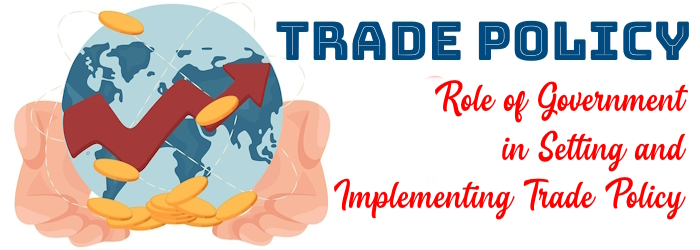Role of Government in Setting and Implementing Trade Policy
Trade policy is a critical aspect of a nation’s economic framework, shaping its interactions with the global market and influencing domestic industries, consumers, and overall economic growth. At the heart of trade policy lies the role of the government in setting and implementing strategies that govern international trade.
Governments play a multifaceted role in formulating, negotiating, and executing trade policies, encompassing areas such as tariff regulations, trade agreements, market access, export promotion, trade facilitation, and dispute resolution. By wielding these powers, governments aim to foster economic development, protect domestic industries, enhance competitiveness, and navigate the complexities of global trade.
This article delves into the various dimensions of the government’s role in trade policy, exploring its significance, objectives, and the mechanisms through which it shapes the trade landscape.

Table of Contents
- 1 Government’s Role in Trade Policy
- 1.1 Policy Formulation
- 1.2 Trade Negotiations
- 1.3 Tariffs and Trade Barriers
- 1.4 Trade Promotion
- 1.5 Trade Regulation and Enforcement
- 1.6 Trade Remedies
- 1.7 Trade Facilitation
- 1.8 Dispute Resolution
- 1.9 Market Access
- 1.10 Trade Promotion and Export Assistance
- 1.11 Trade Agreements and Regional Integration
- 1.12 Monitoring and Data Collection
- 1.13 Intellectual Property Rights Protection
- 1.14 Trade Policy Coordination
- 1.15 Addressing Trade Imbalances and Economic Challenges
- 2 Conclusion
Government’s Role in Trade Policy
Policy Formulation
The government is responsible for formulating trade policies that define the framework and guidelines for international trade. This involves assessing the country’s economic goals, considering domestic industries’ needs and interests, and taking into account global trade dynamics.
Trade Negotiations
Governments negotiate trade agreements on behalf of their countries to establish terms and conditions for trade with other nations. These negotiations involve addressing tariff barriers, non-tariff barriers, market access, intellectual property rights, services trade, and various other trade-related aspects.
Tariffs and Trade Barriers
Governments have the authority to impose tariffs (import duties) on specific goods or services, which affects the cost and competitiveness of imports. They also regulate non-tariff barriers such as quotas, subsidies, product standards, and licensing requirements that can impact trade flows.
Trade Promotion
Governments actively promote exports and facilitate international trade by supporting domestic industries through various measures. These may include export subsidies, financial assistance, trade missions, market research, and trade promotion events to enhance export competitiveness.
Trade Regulation and Enforcement
Governments establish regulations and enforce compliance with trade policies, ensuring fair trade practices and protecting consumers, industries, and intellectual property rights. They may establish customs agencies, trade commissions, and other regulatory bodies to monitor and enforce trade-related rules.
Trade Remedies
Governments employ trade remedies such as anti-dumping duties, countervailing duties, and safeguard measures to protect domestic industries from unfair trade practices, including dumping, subsidies, and sudden import surges that may harm domestic production.
Trade Facilitation
Governments work to streamline customs procedures, reduce trade barriers, simplify documentation requirements, and enhance logistics infrastructure to facilitate smooth trade flows and reduce transaction costs.
Dispute Resolution
Governments participate in international dispute settlement mechanisms, such as the World Trade Organization (WTO), to resolve trade disputes between countries and ensure compliance with international trade rules.
Market Access
Governments negotiate and establish provisions that determine the conditions under which foreign goods, services, and investments can access their domestic markets. This includes determining tariff levels, quotas, and other restrictions on imports.
Trade Promotion and Export Assistance
Governments support domestic businesses by providing export promotion programs, financial assistance, export credit facilities, market information, and trade missions. These initiatives help businesses expand into international markets and increase exports.
Trade Agreements and Regional Integration
Governments actively engage in regional and bilateral trade negotiations to form trade agreements and foster regional integration. These agreements aim to reduce trade barriers, harmonize regulations, and promote economic cooperation between participating countries.
Monitoring and Data Collection
Governments collect and analyze trade-related data, including imports, exports, trade balances, and market trends. This information helps in formulating effective trade policies, assessing the impact of trade agreements, and identifying areas for improvement.
Intellectual Property Rights Protection
Governments establish and enforce laws and regulations to protect intellectual property rights (IPR) such as copyrights, patents, trademarks, and trade secrets. This protection encourages innovation and provides a framework for businesses to engage in global trade.
Trade Policy Coordination
Governments coordinate trade policy among various government departments and agencies to ensure consistency and coherence. This involves collaboration between ministries of trade, finance, agriculture, industry, and other relevant bodies to align policies and address potential conflicts.
Addressing Trade Imbalances and Economic Challenges
Governments may take measures to address trade imbalances, such as implementing import restrictions, export promotion policies, or currency adjustments. Additionally, they may formulate trade policies to address broader economic challenges, including unemployment, inflation, and industrial development.
Conclusion
It’s important to recognize that trade policy is influenced by a complex interplay of factors, including economic objectives, political considerations, public opinion, and global dynamics. Governments continuously evaluate and adapt their trade policies to respond to changing circumstances and to balance the interests of different stakeholders within their economies.


